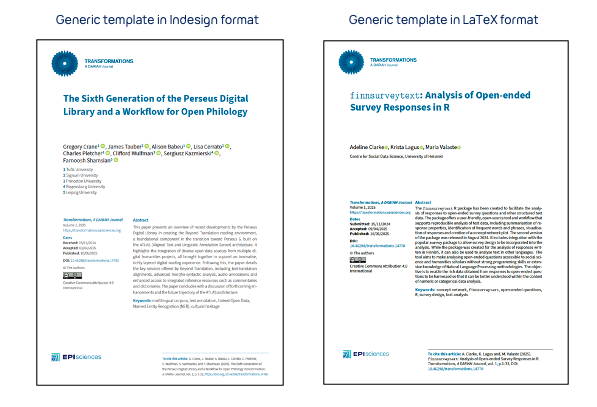Launched in February 2024, the Édisciences project set out to enhance the editorial quality of journals published on the Episciences platform. As the recipient of the third Call for Projects by the National Fund for Open Science (FNSO), Édisciences has become an integral part of the platform’s service offering, designed to meet the needs of journal editorial teams. Its primary goal is to streamline editorial workflows and support the production of structured publications that comply with high editorial standards, including the FAIR principles.
Under the leadership of Editorial Manager Céline Barthonnat, the project facilitated the recruitment of editor Émilie Pineau for a six-month term (September 2024 – February 2025). Three journals partnered with the initiative:Les Cahiers scientifiques du transport (CST), Journal of Theoretical, Computational and Applied Mechanics (JTCAM), and Recherches en didactique des mathématiques (RDM). These titles represent three core disciplinary areas on the platform: the humanities and social sciences, computer science, and mathematics.
The project responds to a common challenge: most journals on the Episciences platform do not currently benefit from professional editorial support. Layout and editorial preparation are typically handled by members of editorial boards—either on a rotating basis, by a single individual such as the editor-in-chief or managing editor, or sometimes even directly by authors themselves.
The Édisciences project aims to develop a text-editing solution that will enable journal teams to work more autonomously. The project has two objectives:
- First, to facilitate the editorial preparation of articles, i.e. proofreading, spelling and typographical corrections, styling, and the application of bibliographic standards.
- The second objective is to produce structured publications that are accessible to people who are unable to read and are interoperable with open archives and reference databases.
The project produced three main deliverables: Tools such as workflows and editorial checklists to clarify work processes ; generic templates to improve the visibility and referencing of publications ; a directory of editorial service providers to connect editorial teams with publishing professionals who can meet their specific needs.
Clarifying work processes
The first stage of the project involved identifying the needs and expectations of the partner journal teams, to develop tools that would facilitate their editorial work. A set of guides — including clear processes for the copy-editing phase and checklists for structuring corrections and page layout — helped the journal teams familiarise themselves with the technical vocabulary.
Creation of generic templates in LaTeX and InDesign formats
The creation of these templates was one of the project’s key deliverables. These had to meet two requirements: bringing graphic consistency to all the journals while ensuring the brand identity of the Episciences platform. The Episciences platform conveys the values of open science and diamond open access, which guarantee scientific quality.
Therefore, the layouts must include all the metadata required for the high-quality indexing of articles in reference databases (citation, DOI and licence).
The created templates can be adapted for each journal. In the top left-hand corner, they display the publication’s logo, and the colour of the titles, headings, and metadata elements matches the main colour of the journal’s website.

Creation of a directory of service providers
The final deliverable of the Édisciences project is the creation of a directory of service providers, which will be added to the range of services offered by the Episciences platform. This directory aims to connect journal teams with service providers for the copy-editing phase. The directory covers proofreading, copy preparation, typographical corrections, typesetting, and page layout.
Thanks to the tools that have been put in place, journals will be able to call on these service providers directly, thereby retaining their autonomy in the editing and publication process.
To conclude this review of Édisciences, we hear from two of the project’s partner journals. Laurent Carnis of the journal Les Cahiers Scientifiques du Transport says that the project has been ‘a precious and indispensable aid that has enabled the journal to survive, while gaining in formalisation and structure’. Maurine Montagnat, meanwhile, highlights the links forged between JTCAM and the Episciences team throughout the project. ‘This is a first step towards structuring the journal on a more permanent basis and ensuring its longevity — an essential condition for disseminating knowledge.’
The Édisciences project tools thus guide journal teams towards greater autonomy and professionalisation, improving the editorial quality of journals hosted by Episciences.